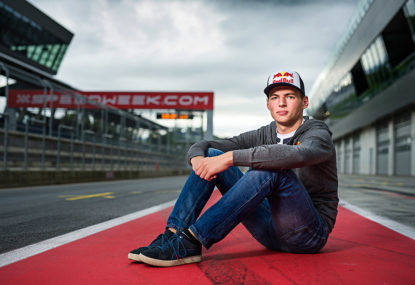Chinese Grand Prix talking points: Stroll has become the most hated F1 driver in a long time - but that's simply an unfair call!
The absolute vitriol against the Canadian that has come from the incident is beyond reprehensible.

Sixteen-year-old Dutchman Max Verstappen isn’t old enough to hold a driver’s license in most countries, yet he will soon be on the Formula One grid with Scuderia Toro Rosso.
The rise of the son of former grand prix racer Jos Verstappen from karting to the elite motorsport category in two years raises the inevitable question of age/inexperience and the confused feeder system below Formula One.
Verstappen has had just one season of car racing after world championship success in karting, currently running second in the European Formula Three championship.
He will skip Formula One feeder/support categories GP3 and GP2 in his promotion, beating out a number of more experienced drivers to the prized seat in the Red Bull junior team that helped develop Sebastian Vettel and Daniel Ricciardo.
Verstappen will qualify for an FIA Super License with some pre-season testing mileage in his Toro Rosso grand prix car, but should he be allowed to race?
Having started karting at age seven, he will have a decade worth of experience by the time he lines up on the grid at the 2015 Australian Grand Prix. And the competitiveness of karting at that elite level is a match for the feeder categories, though more circuit racing would surely be preferred before he’s thrown in at the deep end.
This youth policy is common in motorbike racing, where the likes of Marc Marquez and Jorge Lorenzo started out in their early teens at grand prix level. By the time they got to MotoGP, they were ready for the intensity of the elite competition.
Remember, too, that maturity and experience isn’t always equal to age, so Toro Rosso must surely have seen something in Verstappen to justify the graduation. His ultimate test will come in 2015.
But the concern around Verstappen isn’t so much around his age as the credibility impact it has on the support category climb into Formula One.
Increasingly over the last decade or so, sponsors and manufacturers such as Red Bull have hurried along young drivers through their own nurturing programs.
This has confused the feeder system, with the likes of Formula BMW, World Series by Renault and so many new manufacturer-backed series clogging up the ladder to Formula One, and separating talented youngsters into different categories.
Costs associated in running in the more-fancied categories have skyrocketed as a result, while there are increasingly drivers skipping over this whole system into Formula One.
For example, the Nissan-backed GT Academy is a program whereby talented Gran Turismo gamers get the chance to win a contract in Nissan’s motorsport programs with little in the way of actual driving experience.
Verstappen only needed one year in a feeder category to get into Formula One, a bitter pill to swallow for the hundreds of drivers funding their own campaigns in the various junior formulas.
Whether the sport’s governing body needs to mandate a certain amount of time spent in junior categories in order to justify their existence should be up for debate.
Verstappen will have the chance to prove whether he belongs in Formula One. Others, though, with the talent don’t get the chance because the opportunities simply aren’t there.
The feeder system to Formula One is a mess and Verstappen’s rise proves it’s seemingly irrelevant.